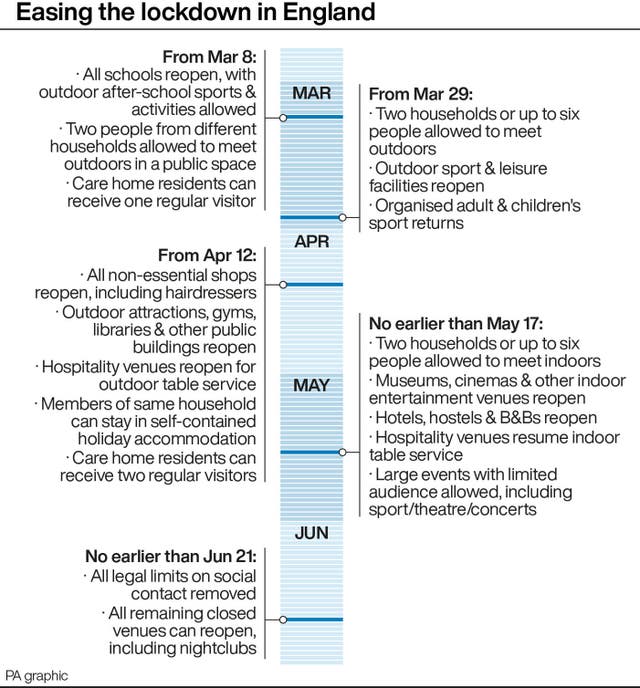UK’s vaccination programme ‘must continue’ despite blood clot fears
GP Dr Ellie Cannon said the rate for the specific type of brain blood clot under investigation was around one in 2.5 million people.

The UK’s vaccination programme must continue if the country is to emerge from lockdown, a member of the Joint Committee on Vaccination and Immunisation (JCVI) has said, as investigations continue into potential links between the AstraZeneca jab and blood clots.
Professor Adam Finn, from the University of Bristol and a member of the JCVI, said it was vital to keep vaccines going as society opens up, in order to help stave off rising infection rates.
It comes as the Medicines and Healthcare products Regulatory Agency (MHRA) and the European Medicines Agency (EMA) are expected to give updates on their investigations into whether the Oxford/AstraZeneca vaccine is directly causing rare brain blood clots.
Some European countries have restricted the vaccine use in younger people following reports of low platelet counts and cerebral venous sinus thrombosis (CVST), a specific type of clot that prevents blood from draining from the brain.
Asked if different vaccines could end up being used for certain groups as more vaccine types come on stream, Prof Finn told BBC Breakfast: “That’s certainly possible. We are seeing another vaccine coming in (Moderna), and further vaccines are approaching licensure, and I know that the UK has made contracts for quite a wide range of different vaccines.
“As time goes forward, we will have much more flexibility about who can be offered what.
“On the other hand, we do need to keep the programme going if the plan to open things up and allow things to get back to normal is to proceed without another wave of the pandemic coming through.
“So it’s quite a tricky balancing act here, getting the balance right, getting vaccines coming through… getting the risk-benefit right for people coming forward.”
He urged people being offered the vaccine at the moment to take it, saying the “risk-benefit is very strongly in favour of receiving the vaccine”.

But Dr Maggie Wearmouth, a member of the JCVI, told the Daily Telegraph that “perhaps slowing things down” with the rollout “until we’re absolutely certain” might be wise.
Speaking in a personal capacity, she said: “The issue is about safety and public confidence. We don’t want to cover anything up that we feel that the public should be knowing.
“We’re not here to blindly follow targets or due dates. We will do what is necessary.”
Prof Finn told BBC Radio 4’s Today programme the reports of clots were being investigated “very seriously” and “very thoroughly”.
He said: “What stands out about them is that we see thrombosis, including thrombosis in the cerebral veins, all the time, but we don’t normally see them in association with a low platelet count – which is a small blood cell which is involved in blood clotting – and so that makes them stand out and makes us think that this is something a little bit different and out of the norm.”
In the last MHRA update, 30 cases of CVST and seven deaths were reported in the UK among more than 18.1 million people receiving the jab.
Prof Finn said: “Those figures quoted were up until March 24 and I think we’ll hear shortly what’s happened subsequent to that in terms of numbers of cases, but we can expect there will have been more in the interim.”
Meanwhile, GP Dr Ellie Cannon, who appears on TV and writes for newspapers, told the BBC the rate for this type of blood clot was around one in 2.5 million people.
She said that, in contrast, among 2.5 million 40-year-olds with Covid “we would expect around 2,000 deaths”, adding the risk of a clot was “incredibly rare”.
Professor Calum Semple, a member of the Scientific Advisory Group for Emergencies (Sage), which advises ministers, said he was “not worried one little bit” about headlines around the AstraZeneca vaccine.
Speaking in a personal capacity, he told LBC radio: “I’ll take (it) myself, I’m 53, my risk of death from Covid is about one in 13,000, for me it’s a no-brainer, I need to have the vaccine.
“This vaccine is safe. What do I mean by safe? You can look right, look left, look right again, cross a road, it’s safe to cross because you don’t see any cars (but) you can trip, you can stumble.
“Nothing is risk-free, but is the vaccine safe? I would say yes.”
Former MHRA chief Professor Sir Kent Woods also told LBC radio: “Covid itself – the infection itself – is known to be associated with a substantial increased risk of blood clots of various kinds.
“At a time when the population has got lots of Covid going around, it’s very difficult to know what the actual background rate of these clotting events is without the vaccine.
“We can say I think that if there is a connection, it’s a very, very rare one.”

Meanwhile, Ravi Gupta, professor of clinical microbiology at the Cambridge Institute of Therapeutic Immunology and Infectious Diseases, also urged people to keep their vaccine appointments.
He told Sky News: “I think that’s on balance at the moment – there’s still transmission of Covid, and there is a risk to all of us of being infected, particularly as the economy is being opened up and society’s opening up, we are at risk of getting severe infection.
“So I would certainly be going forward for that vaccine in the current situation.”
It comes as small business minister Paul Scully told Sky News the Moderna vaccine will be rolled out in England “in the next few days”.
The Government has until now cited commercial sensitivities for not disclosing when Moderna will be rolled out in England, even though the vaccine is already in use in Wales.
The UK has bought 17 million doses of the Moderna vaccine – enough for 8.5 million people.
Jabs are being given out at West Wales General Hospital in Carmarthen, with Elle Taylor, a 24-year-old unpaid carer for her grandmother, becoming the first UK citizen to receive the Moderna vaccine on Wednesday morning.
In Scotland, First Minister Nicola Sturgeon said the first batch of Moderna had arrived in the country on Monday and will be delivered over the coming months.
It has not been confirmed when the rollout of Moderna will begin in Northern Ireland.
Asked about the possible introduction of vaccine passports, Mr Scully said: “The work that’s being done at the moment is concentrating on ticketed big events and those types of things because they are tougher to get back to a semblance of normal, rather than the high streets with non-essential retail and hospitality, including pubs.”





